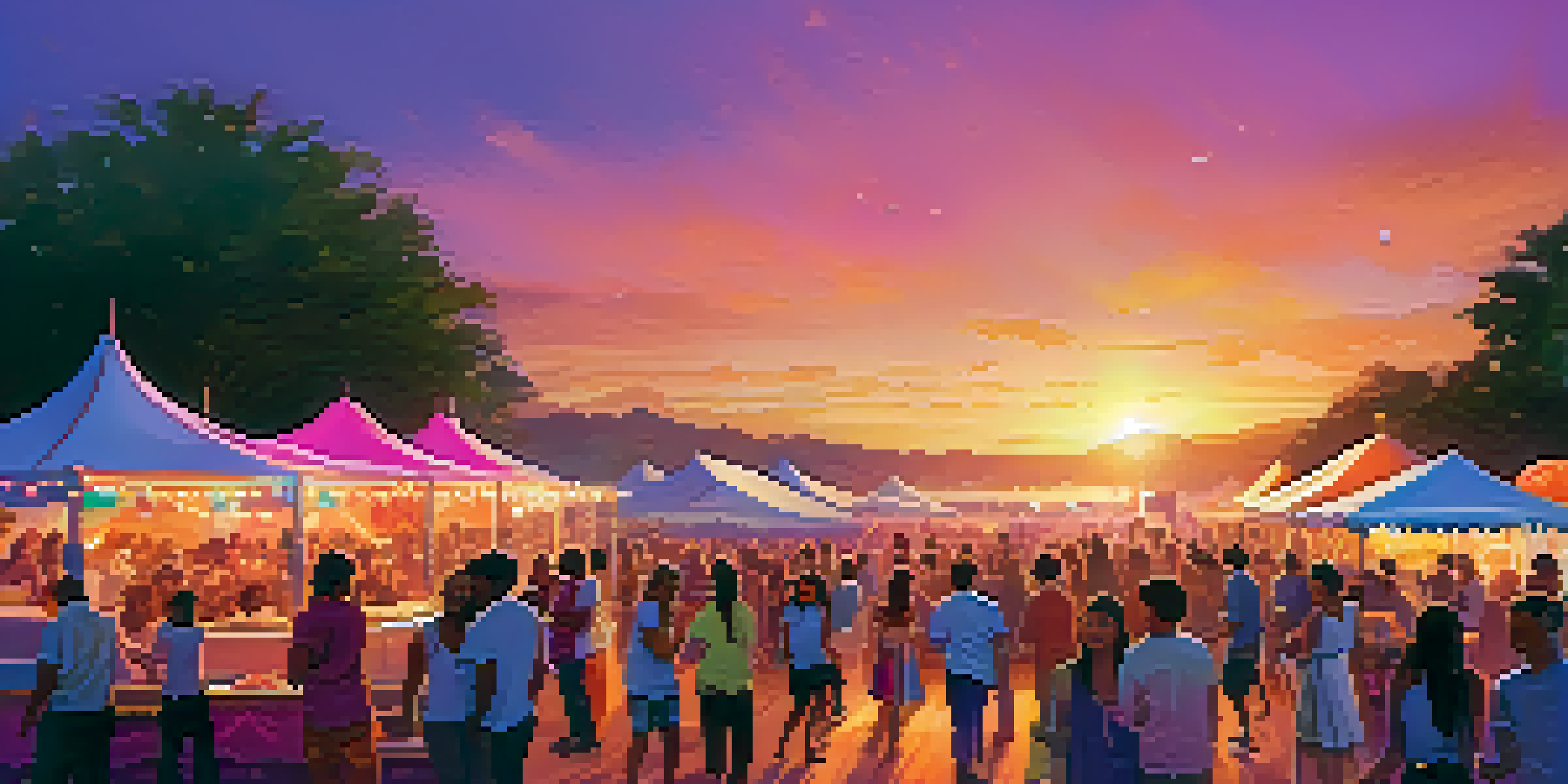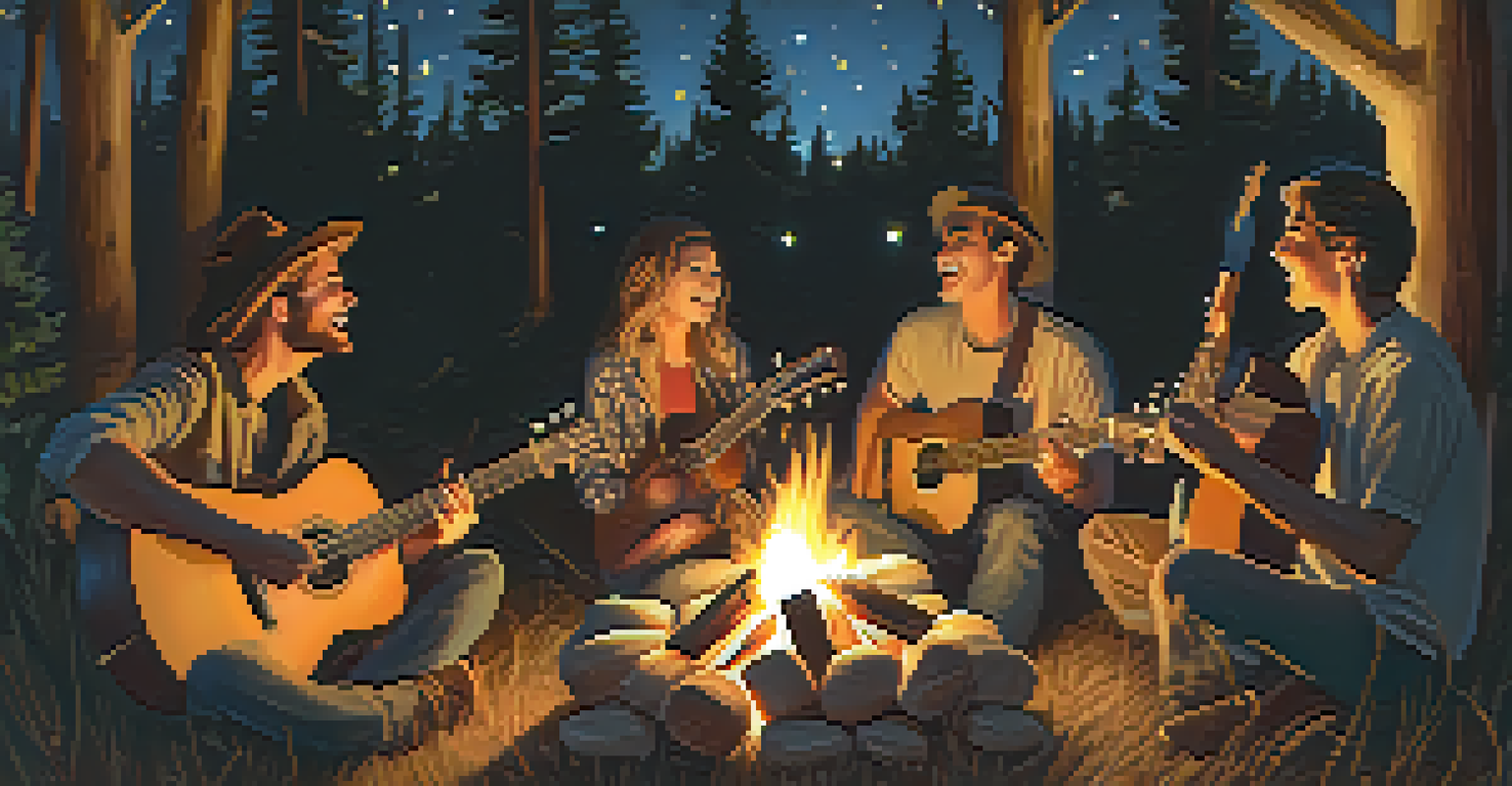How Music Shapes Social Norms and Influences Group Behavior

The Role of Music in Shaping Cultural Identity
Music serves as a powerful medium for expressing cultural identity. From folk songs to contemporary pop, music reflects the values, traditions, and experiences of a community. For instance, traditional music can reinforce a sense of belonging and connection among individuals, fostering a shared identity.
Music is the shorthand of emotion.
Moreover, music genres often speak to specific social groups, promoting unity through a common sound. Think of how hip-hop has become an anthem for empowerment among marginalized communities, serving both as a voice and a rallying cry. This shared experience can shape social norms and expectations within those groups.
As individuals engage with music that resonates with their cultural background, they are more likely to adopt behaviors and attitudes that align with the messages conveyed in those songs. This interplay between music and cultural identity highlights how deeply interconnected these elements are.
Music as a Tool for Social Change
Throughout history, music has played a pivotal role in social movements. Songs like 'We Shall Overcome' became anthems for the Civil Rights Movement, encapsulating the struggle and hope of a generation. This illustrates how music can galvanize people around a shared cause, influencing group behavior and collective action.

When individuals come together to sing or listen to music that embodies their struggles, they often feel a sense of solidarity and empowerment. This collective experience can foster a deeper commitment to social change, as participants are reminded of their shared goals and aspirations.
Music Shapes Cultural Identity
Music reflects and reinforces the values, traditions, and experiences of communities, fostering a shared sense of identity.
Moreover, music can also challenge existing social norms by provoking thought and inspiring dialogue. Artists use their platform to address issues like inequality and injustice, encouraging listeners to question the status quo and consider new perspectives.
The Psychological Impact of Music on Groups
Music has a profound psychological impact on listeners, influencing emotions and group dynamics. For example, upbeat music can elevate mood and increase feelings of camaraderie among group members. This serves to create an environment where collaboration and shared experiences thrive.
The power of music makes all the difference in the world.
Conversely, music can also evoke nostalgia or sadness, which can lead to introspection and discussions about personal and collective experiences. Such emotional responses can help groups process shared challenges, fostering deeper connections among individuals.
These psychological effects demonstrate how music not only reflects social norms but also actively shapes them. By tapping into emotions, music encourages individuals to align their behavior with the sentiments expressed in the songs they engage with.
The Influence of Lyrics on Group Behavior
Lyrics are often the heart of a song, conveying powerful messages that can resonate with listeners. When groups sing along to lyrics that promote unity, love, or resistance, they reinforce the ideas within those words. This shared vocal experience can lead to stronger group cohesion and a sense of purpose.
For example, protest songs often include lyrics that challenge authority or highlight social injustices. When groups adopt these songs during rallies, they not only express their dissatisfaction but also shape their collective identity around the movement's goals.
Music Drives Social Change
Throughout history, music has united individuals and inspired collective action in social movements, becoming anthems for change.
Thus, the way lyrics are crafted can significantly influence group behavior. The messages can inspire action, provoke thought, or create a sense of belonging, demonstrating the power of words in music.
Music Genres and Their Societal Impact
Different music genres can evoke distinct social norms and behaviors. For instance, the rebellious spirit of punk rock has historically challenged societal expectations, encouraging listeners to embrace authenticity and defy conventions. This genre's ethos has influenced many to express their individuality openly.
On the other hand, genres like classical music often convey elegance and sophistication, promoting a different set of social norms. Attending a classical concert may foster behaviors associated with formality and decorum, shaping how individuals interact within that context.
Understanding the societal impact of various music genres highlights how they can influence group behavior and attitudes, either by reinforcing existing norms or encouraging change.
The Role of Music in Creating Shared Experiences
Music has an incredible ability to create shared experiences that bind groups together. Whether it’s a concert, a festival, or even singing in the shower, these moments foster connection and community. When people come together to enjoy music, they often share emotions and memories, creating lasting bonds.
For example, sporting events often feature anthems that rally fans together, enhancing their sense of belonging to a team. The excitement of singing along with thousands of others can be exhilarating, reinforcing group identity and loyalty.
Lyrics Influence Group Behavior
The messages conveyed in song lyrics can inspire unity and purpose, significantly impacting how groups interact and identify.
These shared experiences can influence social norms by promoting behaviors such as cooperation and support. As individuals come together in these musical moments, they often adopt collective values that strengthen their group dynamics.
The Future of Music and Social Norms
As technology continues to evolve, so does the way we experience music. The rise of streaming services and social media platforms has democratized music access, allowing diverse voices to be heard. This shift can lead to the emergence of new social norms as different cultures and ideas intermingle.
Additionally, the rapid spread of viral music trends can influence group behavior in ways we’ve never seen before. For example, challenges on platforms like TikTok can create a sense of community and prompt users to engage in shared activities, shaping social interactions.

Looking ahead, the intersection of music and social norms will likely continue to evolve. As we embrace new ways to connect through music, we’ll also see shifts in how we understand and enact group behaviors and societal values.